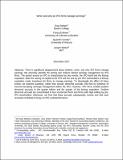When and why do IPO firms manage earnings?
Author(s)
Sletten, Ewa; Ertimur, Yonca; Sunder, Jayanthi; Weber, Joseph P
Download11142_2018_9445_ReferencePDF.pdf (1.106Mb)
Open Access Policy
Open Access Policy
Creative Commons Attribution-Noncommercial-Share Alike
Terms of use
Metadata
Show full item recordAbstract
There is significant disagreement about whether, when, and why IPO firms manage earnings. We precisely identify the timing and motives behind earnings management by IPO firms. The period around an IPO is characterized by two events: the IPO itself and the lockup expiration. Both the raising of capital at the IPO and the exit by pre-IPO shareholders at lockup expiration create incentives for firms to manage earnings. To disentangle the effect of these events, we examine quarterly, rather than annual, abnormal accruals. We find no evidence of income-increasing earnings management before the IPO. However, IPO firms exhibit positive abnormal accruals in the quarter before and the quarter of the lockup expiration. Positive abnormal accruals are concentrated in less scrutinized firms and firms with high selling by pre-IPO shareholders. Moreover, we find that these accruals subsequently reverse and that such reversals contribute to long-run IPO underperformance.
Date issued
2018-05Department
Sloan School of Management; Massachusetts Institute of Technology. Department of EconomicsJournal
Review of Accounting Studies
Publisher
Springer Science and Business Media LLC
Citation
Sletten, Ewa et al. "When and why do IPO firms manage earnings?" Review of Accounting Studies 23, 3 (May 2018): 872–906. © 2018 Springer Science Business Media, LLC
Version: Author's final manuscript
ISSN
1380-6653
1573-7136